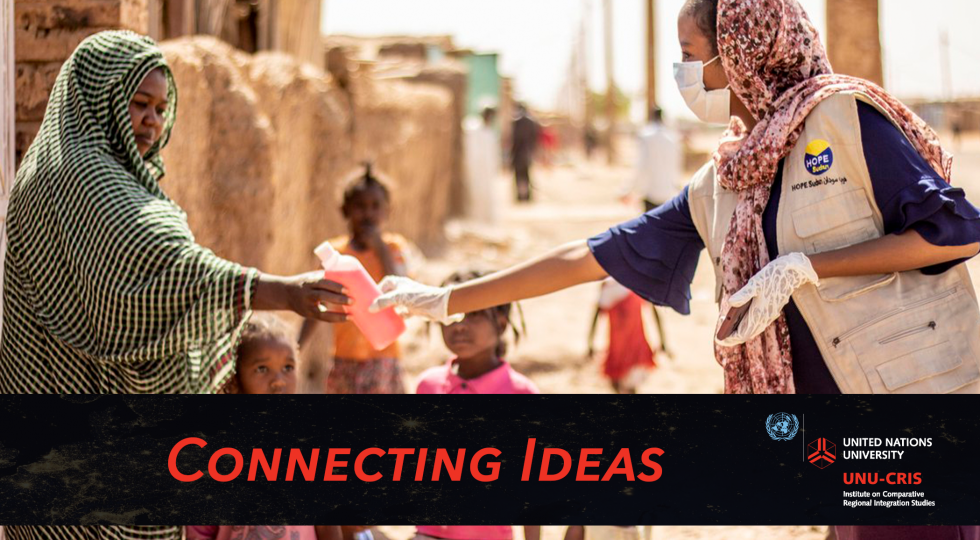COVID-19 and Its Effect on Conflict-Affected and Displaced Women: The Sudanese Case


Ikhlas Mahmoud
Founder and Country Director, International Women's League for Peace and Freedom Sudan (WILPF Sudan)
Contact: Ikhlas2000@outlook.com
3 June 2020 | #20.25 | The views expressed in this post are those of the author and may not reflect those of UNU-CRIS.
The expectation of the spread of the COVID-19 pandemic among women living in conflict-affected countries is much higher than other countries due to their higher risks of exposure to infection. Because these women suffer from issues related to poverty and vulnerability caused by violence and conflicts in their communities, they are frequently also displaced. Due to their unique situations, they often cannot comply with health instructions that prevent the spread of the disease. Rather, they regularly have to do the opposite by continuing to leave their homes to earn an income working in unsafe environments.
Many displaced women work in the informal sector on the streets, such as in the case of many women in Sudan. Many Sudanese women have been suffering from severe armed conflicts since 2003 in the Darfur region, Nuba Mountains, and the Blue Nile regions. These conflicts have left serious impacts on the women living there as it forces many of them out of their homes, leaving them to seek safety and survival in other areas of the country. In addition, as displaced people, they need to quickly adapt to their new environments and find work. Many of these displaced women move to urban centres and cities, such as Khartoum, to join the informal work sector. Selling tea and food on the street are often options for work, however, it greatly increases these women’s risk in disease exposure.
Another point worth mentioning is that women in conflict-affected countries are often the frontline workers in healthcare, humanitarian work, and volunteering in the areas that have the most conflict.

With regards to the COVID-19 pandemic, following the technical assistance and advice of the African Union's (AU) Centre for Disease Control (CDC), African governments, including Sudan, have put out new measures including social distancing, closing borders, and country-wide lockdowns. These measures have greatly helped curb the spread of COVID-19 among African countries, and even those areas affected by conflict, however, displaced and vulnerable women often have no choice but to defy the measures in order to provide for their families.
In Sudan, there are thousands of women working in the streets of Khartoum. These women have a significantly higher risk in getting infected by the virus simply because their livelihood necessities prevent them from complying with the quarantine measures.
Furthermore, Sudanese women living in the conflict-affected areas already suffer from harsh living conditions and poverty, which in turn have negative impacts on their overall nutrition, health, and immune systems. That being said, the main factors that have increased the fragility and vulnerability of Sudanese women include armed conflicts, displacements, a collapsing health sector, and an exhausted economy. Women in these situations are not able to cope with health, environmental, and humanitarian crises.
In conclusion, the risk to women in Sudan and other conflict-affected countries is at an all-time high. The situation requires much more attention at the regional level, but also at the international diplomatic level. My recommendations are that priority is put on the following areas:
- Enhance multilateralism and cooperation to prevent and half conflicts to build peace around the globe.
- Mobilise money and resources to find solutions to issues related to war, health, social security, and welfare.
- Include gender analyses on conflicts, climate change, environments, and other natural disasters, and provide targeted support to women groups in the fragile countries to be more resilient.
- Strengthen multilateral diplomacy to promote human rights, peace, and security by achieving the SDGs and leave group of people behind.
- Commit to placing a higher important of women’s peace and security as an agenda under international peace and security decision-making.
- Foster more feminist foreign policies that will impact women positively within international peace and security.
- Support women’s civic spaces within conflict-affected countries.
More on COVID-19 in the Connecting Ideas series:
The COVID-19 Crisis and Regional Organisations: More Money, More Problems?
What Role for the EU in a Post-COVID-19 Central Asia: On the Way Out or Right Back In?
Key Messages: COVID-19 and Informal Settlements
We Go Digital: The South Korean Case and Sustainable Digital Transformations
Disrupted Latin American Integration: Challenges to Business as a Result of COVID-19
Is Lockdown the Same, Everywhere, For Everyone?
East Asia and Pacific: Countries Must Act Now to Mitigate Economic Shock of COVID-19
COVID-19 (Coronavirus) Drives Sub-Saharan Africa Toward First Recession in 25 Years
COVID-19: An Opportunity for Regional Cooperation in Latin America?
The Irresistible Rise of Health Diplomacy: Why Narratives Matter in the Time of COVID-19
Trade Policy and the Fight Against the Coronavirus
When China Sneezes, Asia Catches a Cold
Yes, Crises Do Happen: A Plea for Feeling More Vulnerable After COVID-19
What Can the Coronavirus Teach Us About Regional Integration in Health?
